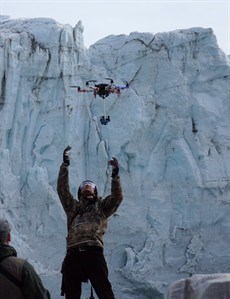
Deep 360 founder Thomas Wallner launches a camera-equipped drone used for filming an interactive web video that serves as a companion piece to the TV documentary “The Polar Sea.” THE CANADIAN PRESS/HO-TVO
Republished November 26, 2014 - 1:21 PM
Original Publication Date November 26, 2014 - 8:45 AM
TORONTO - It's a 10-part TV documentary series, an interactive web doc, an in-depth online magazine and an experiment in the emerging field of virtual reality.
The producers behind "The Polar Sea," which follows a trio of middle-aged amateur sailors on an ambitious and arduous voyage through the Northwest Passage, don't really care how you choose to experience their investigation into climate change in the Arctic.
But they are mighty proud that the main attraction, the TV documentary, is getting so much airtime. "The Polar Sea" is being broadcast on TVO in Ontario starting on Monday. New episodes air every weeknight over the course of two weeks.
"From our point of view it's quite unusual for television because you virtually never get a 10-hour documentary series anymore and I can't think of one ever in this country where we're telling one epic story over the course of it," says producer Kevin McMahon of Toronto-based Primitive Entertainment, who notes that the Canada-German co-production involved five film crews shooting over the course of four months.
McMahon says the idea was to look at climate change through the Arctic because he notes the Arctic is changing faster than anywhere else in the world.
"Ten or 15 years ago it would've been impossible for me or you to sail through the Northwest Passage, but if you're an amateur sailor now that's your goal. In a way it's become like the new Mount Everest, something people want to test themselves against."
The documentary series will also be available for all Canadians to stream at http://www.tvo.org/polarsea. Borrowing a strategy from Netflix, all 10 episodes will go online on Monday for binge watchers to gorge on.
It was decided early on that the TV documentary would be just one part of the "The Polar Sea" story, says McMahon.
"I think everybody in this business is now looking at finding a way to speak to as broad an audience as possible and increasingly that means speaking through different platforms," he says.
"We're trying to offer as many doors into the story as we possibly can."
Digital production company Deep 360 created an interactive 30-minute online companion documentary with a technology called 360-degree video. In a web browser, users can zoom, pan up or down, or spin the camera angle around as the documentary plays. In one incredible scene, viewers are situated on a beach as the northern lights glow overheard.
"Everyone had this wish to create something on the interactive side in tandem with the series that would allow people to actually experience the Arctic," says Deep 360 founder Thomas Wallner, who adds that the online documentary has its own story, characters and footage that are independent of the TV doc.
"We never use the words 'climate change' in the story ever, it's about experiencing the Arctic and experiencing the changes through people's eyes, it's not about hitting people over the head with a heavy-handed message."
The interactive documentary is also compatible with soon-to-be-released virtual reality devices, including the Facebook-owned Oculus Rift and Samsung's Gear VR.
Virtual reality early adopters will be eager to get their hands on content for those devices, which should expose "The Polar Sea" to new audiences worldwide.
"It's the right place at the right time for sure, but it was a strategy from the beginning," says Wallner.
"There may be an audience coming into this that doesn't necessarily care about climate change or the Arctic but they'll be brought into it (by the technology)."
For those who want to go really deep into the subject matter, there's an interactive online magazine — available to read in English, French or German — based on the TV documentary.
McMahon says those who take in "The Polar Sea" — in any of its forms — may be surprised by how much debate there is about the future of the Arctic.
"What we found interestingly enough is they're split. A lot of them are worried about what its going to do to traditional culture, on the other hand a lot of them are interested in what opportunities it opens up for them," he says.
"Whatever will happen in the Arctic — whether global warming continues to undermine the subsistence culture or whether it gives them opportunities to transform into a more industrial culture with more mining and oil wells and so on — all of that is going to be decided by people who live in the Arctic, or at least they're going to have a voice in it."
___
On the web: http://www.tvo.org/polarsea
Note to readers: This is a corrected story. A previous version had an incorrect first name for Kevin McMahon
News from © The Canadian Press, 2014